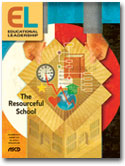There are things you can't reach. But you can reach out to them, and all day long.
Those are the beginning lines from a poem by Mary Oliver,expressing an attitude toward life that I aspire to. To me, the lines are both a reminder to be grateful for what is in our immediate reach and a plea to strive for unity with something profoundly higher.
Perhaps they are odd lines to think of while writing an overview of an issue that is about "doing more without more," as our authors Naomi Calvo and Karen Hawley Miles (p. 19) describe the predicament schools face today. But I thought of those lines when reviewing the many articles in this issue that confirm how necessary it is to keep our priorities straight.
In this issue, you will hear about how schools are responding to economic and education crises that have resulted in many teachers and principals being furloughed, in after-school programs being eliminated, in school days being cut from calendars, and in average class sizes being bumped up. Although some of our authors suggest how to strategically cut programs and staff, you won't read much here about how money doesn't matter when it comes to providing a good education for students. Nor will you find the blame-the-educators agenda that suggests that getting rid of bad teachers is the magic bullet that will restore quality and equity in education.
What you will read about is how inventive schools and leaders are taking action and valuing the resources they have—people, time, technology, and community support—to make sure that students have a fighting chance to reach their potential. You'll also read some passionate commentary from educators who tell why we must restructure current education policy—Marc Tucker on why current policies for ensuring teacher quality are backfiring (p. 42); James Harvey on how relying on privatization for innovation endangers public schools (p. 48); and Diane Ravitch on why we must fight to change the poisonous narrative about schools (p. 54).
At a recent meeting at ASCD, nine educators from Virginia, Maryland, and the District of Columbia spoke of the daily challenges their schools face. Several administrators talked about how their schools were striving to meet adequate yearly progress (AYP) goals while struggling with lower funding and more diverse student needs.
One superintendent told of how her students have had to adjust to having teachers and principals come and go as the educators were furloughed or left for other positions. "Some of our kids have had two or three teachers in a year," she noted. A teacher told the group why two of the best teachers she knew were leaving her school: "They felt they no longer had the time or the authority to do what they know is right for their students."
One principal described the growing financial disparity among students, citing his school's 12 percent increase in economically disadvantaged students. A teacher from another school ruefully noted, "One of my students didn't have money to buy a required spiral notebook. This in a school whose student parking lot is filled with Lexuses."
The consensus of these nine voices from the trenches might be expressed in one principal's comment: "Our major concern is how to maintain teaching quality (not teacher quality) with all the cutbacks. Creativity, communication skills, problem solving, preparing kids for the jobs of the future—these are not addressed in AYP," he said. "How do you achieve quality when you have less?"
That question is what this issue is about. Thanks to all of you who are reaching to achieve quality education, equity, and the welfare of all students. Know that what you are reaching for is worth the struggle.

